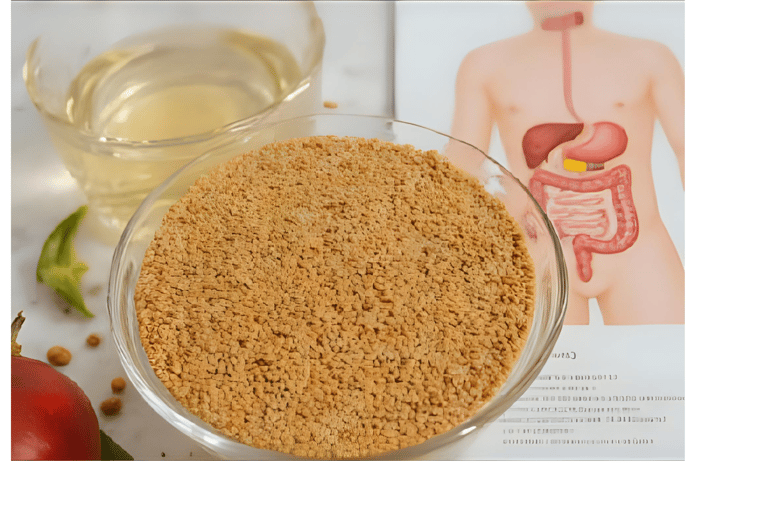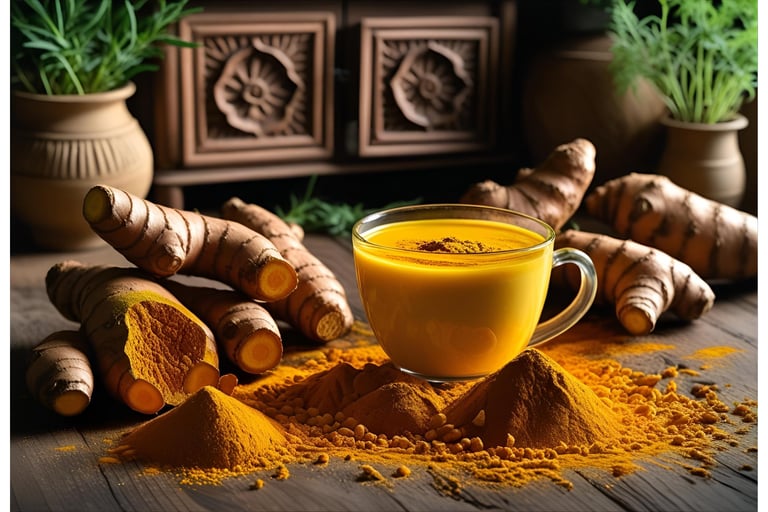10 Kitchen Ingredients for a Healthier Life: Ayurvedic Remedies and Their Science
In Ayurveda, food is not merely sustenance but a vital component of healing. The emphasis on fresh, whole ingredients aligns with contemporary nutritional science's focus on the benefits of a balanced diet rich in vitamins and minerals.
5/29/202513 min read


Introduction to Ayurvedic Wisdom and Modern Science
Ayurveda, a traditional Indian system of medicine, is grounded in the belief that health is a state of balance between body, mind, and spirit. This ancient practice, with roots that trace back over 5,000 years, offers a holistic approach to wellness that emphasizes natural remedies derived from the environment, particularly from commonly available kitchen ingredients. At its core, Ayurveda prioritizes personalized treatment, recognizing that each individual possesses a unique constitution, or dosha, which influences their health and well-being.
Modern science increasingly supports the principles of Ayurveda, demonstrating that many natural remedies possess beneficial properties that promote health. Research has shown that the ingredients commonly found in our kitchens, such as turmeric, ginger, and garlic, have anti-inflammatory, antioxidant, and antimicrobial qualities. These scientific findings lend credence to ancient Ayurvedic practices, highlighting the efficacy of natural healing in contrast to synthetic solutions often laden with side effects.
In Ayurveda, food is not merely sustenance but a vital component of healing. The emphasis on fresh, whole ingredients aligns with contemporary nutritional science's focus on the benefits of a balanced diet rich in vitamins and minerals. This alignment fosters a deeper appreciation for how everyday ingredients can significantly impact health outcomes. By integrating Ayurvedic principles into daily life, individuals can utilize these household staples to promote health, enhance vitality, and prevent illness.
Moreover, the significance of kitchen ingredients in Ayurveda extends beyond their nutritional value; they embody a philosophy of wellness that encourages mindfulness in food choice and preparation. As we navigate a world increasingly focused on convenience and fast solutions, returning to the wisdom of Ayurveda offers a powerful reminder of the importance of natural remedies. This exploration will pave the way for understanding how specific kitchen ingredients can serve as potent tools for a healthier life.
Turmeric: The Golden Healer
Turmeric, renowned for its vibrant golden hue, has been a cornerstone in Ayurvedic medicine for centuries. Historically, this spice has been celebrated not only for its culinary uses but also for its remarkable health benefits. The active compound in turmeric, curcumin, is widely recognized for its potent anti-inflammatory and antioxidant properties. Extensive research supports the efficacy of curcumin in reducing pain, promoting skin health, and enhancing the immune system.
Scientific studies suggest that curcumin's anti-inflammatory effects are comparable to that of some non-steroidal anti-inflammatory drugs (NSAIDs), making it a valuable natural remedy for managing chronic pain conditions, such as arthritis. Furthermore, the antioxidant nature of curcumin helps combat free radicals in the body, which can contribute to cellular damage and aging. This dual action—reducing inflammation and providing antioxidant support—positions turmeric as a powerful ingredient in the quest for better health.
In addition to its physical health benefits, turmeric is also celebrated for its positive effects on skin conditions, including acne, eczema, and psoriasis. The anti-inflammatory and antibacterial properties of curcumin play a crucial role in promoting clearer, healthier skin. Furthermore, the spice's ability to boost the immune system makes it a valuable addition to your diet, especially during cold and flu seasons.
Incorporating turmeric into daily meals is both simple and versatile. One practical approach is to add it to soups, stews, or roasted vegetables, enhancing both flavor and health benefits. Additionally, turmeric can be added to smoothies or warm beverages, such as golden milk, which combines turmeric with milk and spices. As more individuals seek natural remedies for health improvement, making turmeric a staple in your pantry can be a significant step toward embracing a healthier lifestyle.
Ginger: The Digestive Wonder
Ginger, a prominent spice in Ayurvedic medicine, has long been recognized for its remarkable digestive properties. This potent root possesses bioactive compounds, particularly gingerol, which are chiefly responsible for its therapeutic benefits. Gingerol, alongside other components, has been studied for its anti-inflammatory and antioxidant effects, making ginger a powerful ally in promoting digestive health.
Garlic: The Heart Protector
Garlic, scientifically known as Allium sativum, has long been celebrated in Ayurveda for its remarkable cardiovascular benefits. This potent ingredient contains sulfur compounds, most notably allicin, which are responsible for its beneficial effects on heart health. Numerous studies have indicated that these compounds can significantly lower blood pressure and cholesterol levels, thereby reducing the risk of heart disease. In fact, a meta-analysis published in the journal Nutrition demonstrated that garlic supplementation effectively reduces total cholesterol and low-density lipoprotein (LDL) cholesterol levels, making it a beneficial addition to any heart-healthy diet.
Furthermore, garlic's anti-inflammatory properties also contribute to its ability to prevent chronic diseases. Chronic inflammation is a known risk factor for cardiovascular issues, and the regular consumption of garlic may help combat this. Research published in the Journal of Clinical Hypertension highlights that participants who incorporated garlic into their diets experienced notable reductions in systolic and diastolic blood pressure, further supporting its role as a heart protector.
In the kitchen, incorporating garlic into your meals can be both easy and delicious. It can be roasted, sautéed, or used raw to enhance the flavor of various dishes. For example, you can add minced garlic to salad dressings, stir-fries, or marinades to create a tantalizing taste while reaping its health benefits. Additionally, garlic can be blended into soups, sauces, and even hummus, making it a versatile ingredient suitable for a wide array of cuisines. Experimenting with garlic not only boosts the flavors of your dishes but also significantly contributes to a healthier lifestyle.
Neem: The Natural Detoxifier
Neem, scientifically known as Azadirachta indica, is a prominent ingredient in Ayurvedic medicine lauded for its myriad health benefits. Often referred to as a natural detoxifier, neem possesses properties that contribute significantly to overall well-being. Its leaves, in particular, are rich in bioactive compounds such as flavonoids, triterpenoids, and various phytochemicals, which confer numerous medicinal benefits. Research has established neem's antiseptic properties, making it effective in combating bacterial, fungal, and viral infections. Moreover, its anti-inflammatory effects help in reducing inflammation in the body, a key factor in various chronic diseases.
Scientific evidence supports neem's role as a powerful detoxifier. Studies indicate that neem extracts can enhance the hepatic function, which is crucial for detoxifying harmful substances from the body. By promoting liver health, neem facilitates the elimination of toxins and supports digestion. Additionally, it addresses skin conditions by purifying the bloodstream and reducing free radicals, thus promoting clearer and healthier skin. This detoxification effect can be beneficial for individuals suffering from acne or other skin disorders, making neem an invaluable part of a health-oriented lifestyle.
Incorporating neem into your daily regimen can be straightforward and rewarding. One popular method is using neem-infused oils, which can be applied topically to address skin issues or deliver the detoxifying properties of neem directly to the body. Alternatively, neem leaves can be steeped to brew a herbal tea, providing both a refreshing beverage and significant health benefits. This tea can be consumed regularly to support detoxification processes naturally. Through these simple home remedies, individuals can harness the medicinal properties of neem while promoting overall health and wellness.
Honey: The Sweet Healer
Honey, often referred to as 'the sweet healer,' has been an integral part of Ayurvedic medicine for centuries. This natural sweetener is not only cherished for its ability to enhance flavors but also revered for its numerous medicinal properties. In Ayurveda, honey is regarded as a powerful ingredient that possesses antimicrobial and soothing effects, particularly beneficial for the throat and respiratory system.
Scientific studies have shown that honey exhibits strong antimicrobial properties, making it effective against various pathogens. Research indicates that honey can inhibit the growth of certain bacteria, including strains that are known to cause respiratory infections. Moreover, honey is an effective cough suppressant, providing relief to those suffering from a sore throat or cough. Its viscous nature coats the throat, reducing irritation and promoting healing, thereby making it a valuable addition to herbal remedies aimed at alleviating respiratory ailments.
Incorporating honey into one's daily routine can be done in several ways. For instance, adding honey to herbal teas not only enhances flavor but also infuses the beverage with its healing qualities. Herbal remedies that combine honey with ingredients like ginger or lemon can further improve respiratory health. Additionally, honey serves as a natural alternative to processed sugars, offering a healthier way to satisfy sweet cravings while reaping its myriad health benefits.
To maximize the health advantages, it is recommended to choose raw, unprocessed honey, as it retains more of its beneficial properties compared to refined varieties. Ultimately, honey stands out as a versatile ingredient in Ayurveda, promoting overall well-being while providing a delicious and natural source of sweetness in our lives.
Cinnamon: The Metabolic Booster
Cinnamon, a notable spice with a rich history in Ayurvedic practices, is highly esteemed for its potential to enhance metabolic health. This aromatic seasoning, derived from the inner bark of trees belonging to the Cinnamomum family, is well-known not only for its flavor but also for its numerous health benefits. One of the primary advantages attributed to cinnamon is its ability to regulate blood sugar levels. Studies have shown that cinnamon can improve insulin sensitivity, which is crucial for maintaining balanced glucose levels in the bloodstream. This characteristic makes it particularly beneficial for individuals managing diabetes and those aiming to prevent metabolic disorders.
Moreover, cinnamon is recognized for its antioxidant properties. Antioxidants play a vital role in combating oxidative stress within the body, which can lead to various chronic diseases. The inclusion of cinnamon in a balanced diet can help reduce inflammation and improve overall health. Its potent compounds, such as cinnamaldehyde, have been studied for their ability to support metabolic processes, further enhancing the spice's reputation as a natural health remedy.
Incorporating cinnamon into your meals is both easy and delicious. One popular option is to sprinkle ground cinnamon over breakfast items such as oatmeal or yogurt. This simple addition can transform a standard meal into a flavorful and health-boosting option. Furthermore, integrating cinnamon into smoothies or using it as a seasoning for roasted vegetables can elevate the taste and nutritional value of your dishes. For those who enjoy baking, adding cinnamon to desserts like apple pie or muffins not only enhances flavor but also provides various health benefits. By exploring these culinary uses, individuals can effortlessly add this powerful spice to their daily routine, aligning their eating habits with Ayurveda's holistic approach to health.
Fenugreek: The Versatile Health Enhancer
Fenugreek, scientifically known as Trigonella foenum-graecum, is a herb celebrated in Ayurvedic medicine for its multitude of health benefits. Its seeds are rich in compounds such as galactomannan, fiber, and various antioxidants, making it a powerhouse for promoting overall wellness. Research has shown that fenugreek can play a significant role in managing blood sugar levels, which is especially beneficial for individuals with diabetes. A study published in the Journal of Diabetes and its Complications highlighted that regular consumption of fenugreek seeds can improve glucose tolerance and insulin sensitivity, proving its efficacy as a natural remedy for diabetes management.
Furthermore, fenugreek is recognized for its ability to support digestive health. It works by stimulating the production of digestive enzymes, thus aiding in digestion and reducing issues such as bloating and gas. The presence of soluble fiber also contributes to promoting gut health by serving as a prebiotic, which fosters the growth of beneficial gut bacteria. Scientific studies have reinforced these claims, underscoring fenugreek's relevance in traditional medicine.
Incorporating fenugreek into your diet is both easy and flavorful. One of the simplest ways to enjoy its benefits is by preparing fenugreek-infused water. To make this, soak a teaspoon of fenugreek seeds in water overnight. Strain the mixture in the morning and drink the water on an empty stomach. This can enhance digestion and provide a refreshing start to your day. Additionally, fenugreek can be added to various dishes, such as curries or stir-fries, as a spice or seasoning. Its slightly bitter taste complements many savory meals, making it a versatile ingredient in the kitchen that contributes immensely to a healthier lifestyle.
Cumin: The Digestive Ally
Cumin, a spice derived from the seeds of the Cuminum cyminum plant, is revered in Ayurveda for its numerous health benefits, particularly concerning digestive health. Traditionally, cumin is considered a warming spice that stimulates the digestive fire, or Agni, promoting the body’s ability to digest food and absorb nutrients effectively. The unique compounds in cumin, such as cuminaldehyde and essential oils, play a significant role in enhancing digestive processes. These compounds assist in the secretion of digestive enzymes, thus facilitating better digestion and nutrient absorption.
Scientific studies support the traditional claims regarding cumin's health benefits. Research has demonstrated that cumin can significantly improve digestion, reduce bloating, and relieve constipation. Furthermore, evidence suggests that cumin may aid in weight management by boosting metabolism and reducing body fat. Individuals incorporating cumin into their diets often report improved gastrointestinal health, which is essential for overall well-being.
To incorporate cumin into daily meals, one can consider simple recipes. For instance, roasted cumin seeds can be used as a seasoning for roasted vegetables or added to homemade spice blends for curries. A comforting cumin-infused lentil soup can be prepared by sautéing onions, garlic, and ginger, then adding lentils, water, and a teaspoon of cumin seeds, allowing the mixture to simmer until fully cooked. Additionally, cumin can be sprinkled over salads or mixed into yogurt to create a refreshing dip for a nutritious snack.
Ultimately, cumin is not merely a flavor enhancer but a significant addition to a healthier lifestyle. By understanding its digestive properties and integrating it into everyday cooking, individuals can harness its benefits while enjoying its distinctive taste.
Black Pepper: The Enhancer of Nutrient Absorption
Black pepper, often referred to as the "king of spices," holds a significant position in Ayurvedic medicine due to its remarkable ability to enhance the absorption of nutrients from food. This potent spice contains an active compound known as piperine, which is primarily responsible for its health benefits. Piperine enhances the bioavailability of various nutrients, including vitamins and minerals, ensuring that the body can effectively utilize these essential elements.
Research indicates that piperine can significantly increase the absorption of certain nutrients such as beta-carotene, curcumin, and selenium. For instance, studies have shown that when curcumin—a compound found in turmeric—is consumed with black pepper, its absorption in the digestive tract increases substantially. This synergistic effect showcases the importance of incorporating black pepper into culinary practices, particularly when using other nutrient-rich ingredients. By adding just a pinch of black pepper, individuals can potentially amplify the health benefits of their meals.
Beyond its nutrient absorption properties, black pepper also possesses antioxidant and anti-inflammatory qualities, contributing to overall health. As noted in Ayurveda, black pepper is believed to stimulate digestion and enhance metabolic function, further aiding in the absorption process. To use black pepper creatively in cooking, one might consider adding it to a variety of dishes, from soups and salads to roasted vegetables. It pairs well with a diverse range of spices, thereby enriching flavors while simultaneously boosting nutritional intake.
In conclusion, the strategic use of black pepper in daily cooking not only elevates the taste of meals but also serves as a valuable means of improving nutrient absorption. Its integration into Ayurvedic formulations further emphasizes its importance in promoting overall health and well-being. By embracing this versatile spice, one can harness its myriad benefits for a healthier life.
Cardamom: The Breath Freshener
Cardamom, often referred to as the "queen of spices," holds a revered place in Ayurvedic medicine due to its numerous health benefits. Known for its cooling properties, cardamom aids digestion and is traditionally used to alleviate stomach discomfort and bloating. The spice contains essential oils such as cineole, which contribute to its distinctive flavor and numerous therapeutic properties.
Research indicates that cardamom possesses potent anti-inflammatory and antioxidant effects. These properties can help combat oxidative stress in the body, thereby reducing the risk of chronic diseases. A study published in the Journal of Medicinal Food explored the potential of cardamom in supporting cardiovascular health, highlighting its ability to improve circulation and lower blood pressure. Furthermore, its antimicrobial activities may contribute to fresher breath, making it a natural remedy for halitosis.
Incorporating cardamom into your diet can be quite simple due to its versatility in culinary applications. It can enhance a wide range of dishes, from savory to sweet. For instance, adding crushed cardamom pods to curries and soups not only infuses them with a warm flavor but also maximizes their health benefits. In baking, cardamom can be used in cookies, muffins, and even traditional desserts like rice puddings, providing both a unique flavor and health-enhancing properties.
To enjoy the full benefits of cardamom, consider making a refreshing cardamom tea by steeping crushed pods in boiling water. This not only serves as a delightful beverage but also aids digestion and freshens breath. Including cardamom in your daily meals is a simple yet effective way to embrace its healing properties and add a rich flavor to your culinary repertoire.
Conclusion
Incorporating Ayurvedic kitchen ingredients into daily life represents a harmonious blend of ancient wisdom and contemporary scientific understanding. The knowledge gleaned from centuries of Ayurvedic practice offers invaluable insights into maintaining optimal health and well-being. By integrating these natural remedies into our culinary routines, we can enhance our dietary habits and nurture our bodies in a holistic manner.
Each of the ten kitchen ingredients discussed throughout this blog post—such as turmeric, ginger, and black pepper—carries a wealth of benefits supported by modern research. These ingredients not only add flavor to our dishes but also contribute to improved digestion, reduced inflammation, and increased immunity. Embracing these practices promotes a balanced lifestyle and encourages a deeper connection to the food we consume.
Readers are encouraged to explore the richness of these Ayurvedic remedies, considering the simple decision to incorporate them into everyday meals. These small changes in our kitchen can create a ripple effect, fostering greater awareness of our health and empowering us to take charge of our well-being. By reconnecting with the forgotten knowledge of traditional healing practices, individuals can cultivate a lifestyle that not only honors ancient approaches but also aligns with modern health principles.
Ultimately, adopting these Ayurvedic kitchen ingredients can lead to significant improvements in overall health. As we navigate the complexities of the modern world, let us not overlook the time-tested wisdom that encourages us to prioritize our health. The journey toward a healthier life begins in the kitchen, through the conscious selection and use of ingredients that support our physical and mental vitality.






















